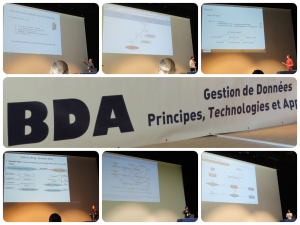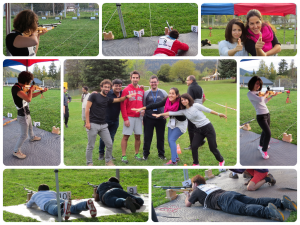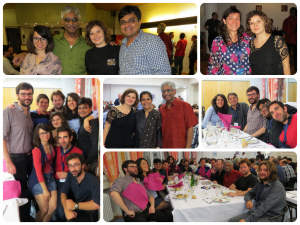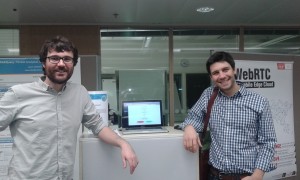The BDA conference celebrated its 30th anniversary in the beautiful scenery of Autrans.

It featured three captivating keynotes given by renowned invited speakers:
- « Big Data Integration », Divesh Srivastava (AT&T Labs)
- « Big Data: Hype and Reality », Dr C. Mohan (IBM Almaden Research Center)
- « Declarative Modeling for Machine Learning and Data Mining », Luc De Raedt (Katholieke Universiteit Leuven)
And also a workshop with practical information tailored particularly for young researchers:
- « Hints on publication: the story of Ike Antkare », Cyril Labbé (LIG Lab, Université Joseph Fourier)
- « The life of a researcher : a personal viewpoint », Serge Abiteboul (INRIA & ENS Cachan)
OAK members presented a great variety of works.

Dario presented two papers “PigReuse: Reuse-based Optimization for Pig Latin” (Jesús Camacho-Rodríguez, Dario Colazzo, Melanie Herschel, Ioana Manolescu and Soudip Roy Chowdhury) and “PAXQuery: Efficient Parallel Processing of Complex XQuery” (Jesús Camacho-Rodríguez, Dario Colazzo and Ioana Manolescu), with Juan assisting him with a small demo on the second work.
Damian presented “Reformulation-based Query Answering in RDF” (Damian Bursztyn, François Goasdoué, Ioana Manolescu and Alexandra Roatiș), and Katerina talked about “Immutably Answering Why-Not Questions for Equivalent Conjunctive Queries” (Nicole Bidoit, Melanie Herschel and Katerina Tzompanaki).
Even though they’re not official OAK members, I could not resist including Danai and Virginie who also presented their works, “SAKey: Scalable Almost Key discovery in RDF data” (Danai Symeonidou, Vincent Armant, Nathalie Pernelle and Fatiha Saïs), respectively “Une algèbre floue pour l’interrogation flexible de bases de données graphe” (Olivier Pivert, Virginie Thion, Helene Jaudoin and Grégory Smits).
Finally, the popularity of the demo “How to deal with Cliques at Work” (Benjamin Djahandideh, François Goasdoué, Zoi Kaoudi, Ioana Manolescu, Jorge-Arnulfo Quiané-Ruiz and Stamatis Zampetakis) presented by Stamatis and Benjamin was so distracting that we forgot to take a photo. We consider them victims of their own success.
After the intellectual program, the conference featured some physical training.
It is with great pleasure that we introduce OAK Covert Ops:

While a team made with Benjamin and Stamatis was the initial intimidator, it turns out that Danai, Katerina and Soudip were the ones killing all the competition. Best not to mess with these young researchers!
With a final image we say good bye to BDA 2014. We look forward to the next year!







